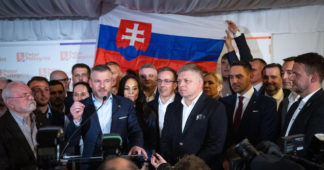By Dimitris Konstantakopoulos
The attempted assassination of the leftist and a critic of Western policy in Ukraine Prime Minister of Slovakia Robert Fico, is probably the most alarming of a plethora of indications we already have regarding both the rapid deterioration of the state of democracy in Europe and, also, of the intention of powerful western circles to escalate Western intervention in Ukraine. We recall the dispatch to Kiev of weapons that can strike deep into Russian territory, Macron’s statements about sending French troops to Ukraine, the Polish Foreign Minister’s statement that there is no diplomatic solution to the Ukrainian problem, among many others. This is objectively a policy of preparing for world war, whether those who carry it out realize it or not, and such a policy of course presupposes the “cleansing” of the West of any “dissent”, as well as the violent repression of any protesters. And this preparation seems to include major terrorist acts like the blowing of the NordStream pipeline, an action reminiscent of the Gladio years.
Some were already quick to link the assassination attempt to Fico’s politics. We cannot, of course, be certain of anything at this stage of the investigation, and in particular of who is behind the attempt. But, if we don’t know who was behind the attempt, we do know who could hope to profit from it. The fact is the Slovak Prime Minister stood out like a fly in the EU with his positions and policies, criticising NATO’s policy in Ukraine, and also expressing an ambition to resist the forces of global neoliberalism which, as he said, threatened his country. Regardless of who armed the would-be assassin’s hand, the attempt will serve to terrorize any international politician who wants to distance himself from America. Just recently, the Hungarian PM has read in the Financial Times the project of Brussels to destroy the economy of his country if he insisted on vetoing EU’s “help” to Ukraine. Outside Europe, we have also the recent example of the popular Pakistani Prime Minister Imran Khan, whom the United States is accused of overthrowing https://www.commondreams.org/
Fico suspended the supply of arms and ammunition to Ukraine, limited any Slovak aid to Kiev in the humanitarian sector and said that Putin would not be arrested if he visited Ukraine. He criticised the previous government’s policy of sending arms to Ukraine and then ordering new weapons to America, cutting social spending to pay for them and promised to revise the defence agreement with the US.
Fico described the conflict in Ukraine as a proxy war between the US and Russia, and called on NATO and the EU to “de-escalate” immediately and push for peace talks, calling for Ukraine to receive security guarantees from both Russia and NATO and to become a buffer zone between East and West. It should be noted that Fico has also criticised the war in Iraq and it was during his time that Slovak troops withdrew from that country.
By pursuing this policy, Fico became one of the few European leaders who make a policy in line with what their public opinion wants and not with what want from them the transnational centres that now control the majority of European politicians. Between 60% and 70% of Slovaks are in favour of good relations with Russia, while 66% believe that the United States is pushing the country into conflict with Russia.
Fico is also one of the few successful left-wing politicians at a time of defeats and degeneration of the left across Europe.
Of course, all this has made him a “black sheep” of the Western press, which has described his election as a serious geopolitical threat to NATO calling him a “populist” and a “nationalist”.
As we have already said, no one can be sure of what has happened. But assassinations of prime ministers are not a common occurrence in Europe, not even during the Cold War and the Gladio years.
It is probably a very serious indication of where we are and where we are going if the European people do not rise up to protect their rights and prevent the coming global War.
We remind our readers that publication of articles on our site does not mean that we agree with what is written. Our policy is to publish anything which we consider of interest, so as to assist our readers in forming their opinions. Sometimes we even publish articles with which we totally disagree, since we believe it is important for our readers to be informed on as wide a spectrum of views as possible.











